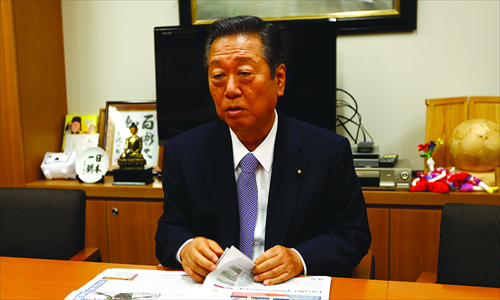Don’t target Japanese when tackling Abe
Editor's Note:
The Sino-Japanese relationship has entered an intense phase since September 2012, when Tokyo unilaterally "nationalized" the Diaoyu Islands. Japanese Prime Minister Shinzo Abe's visit to the controversial Yasukuni Shrine in December 2013 further strained the bilateral relationship and stalled dialogue between leaders of the two sides. Global Times (GT) reporters Chang Meng and Pan Ziyi sat down with Japanese politician Ichiro Ozawa (Ozawa), president of the People's Life Party and a former president of the Democratic Party of Japan, in Tokyo, to discuss the future path of Sino-Japanese relationship.

Ichiro Ozawa Photo: Yang Hui/GT
GT: Do you agree that the current impasse in Sino-Japanese relationship cannot be broken unless Prime Minister Shinzo Abe steps down?
Ozawa: The possibility of improvement in the bilateral relationship largely depends on the Chinese side. If China doesn't acknowledge Abe's moves, then there is no way to ease the tension.
Abe's views toward historical issues are rare in Japan. He is critical of the postwar structure and supports the prewar policies. Such ideas share nothing in common with China's stance and will not reach an agreement.
GT: What could China and Japan do to help improve the bilateral relationship?
Ozawa: Most Japanese people have a rather deep reflection toward history and would like to see a good relationship with China.
However, I would like to advise Chinese leaders not to target the general Japanese public while criticizing Abe.
As an opposition party, we value the Sino-Japanese relationship very much. Although economic relations between the two nations have yet to suffer much, political communications, especially senior-level dialogues, have been stalled.
I think it's improper to shun communications between the two governments and parties, as it would further dilute the bilateral relationship if it stays this way, a situation we don't want to see.
We have been working hard to push forward the bilateral relationship. Personally, I think grass-roots people-to-people communications have significant meaning.
I have been taking part in the Great Wall Plan for years, bonding with the Communist Youth League and hosting 20 to 30 Chinese students every spring. These efforts might be in vain if China strictly refuses any forms of official communication.
GT: Would Abe's short-term stimulation to the economy have long-term benefit for Japan?
Ozawa: Abenomics is a resounding slogan now, but it cannot solve the fundamental problems in Japan.
The consumption tax will rise to 10 percent next year from 8 percent, which might cause instabilities in employment and individual income while possibly widening wealth gaps between different regions.
What Abe is doing now is to replicate the US pattern, but it will hit the wall hard at a certain point in the future as it doesn't fit Japan's reality.
GT: The trade volume between China and Japan decreased last year. How would Japan's long-term economic development be affected if it loses the Chinese market? Ozawa: China is Japan's largest trading partner. Japan's economy would naturally suffer if the bilateral economic communication were in trouble. But China might suffer even more. After all, Japan has a developed economy, but China has a bigger wealth gap and sprawling social controversies. The two countries must help each other.
I often talk with Chinese leaders, and I've long been suggesting that China should carry out serious political reform.
Deng Xiaoping saved the country's economic failure caused by the Great Leap Forward (1958-60) and the Cultural Revolution (1966-76) through reform and opening-up and reached success, which was very impressive.
However, facing various social conflicts now, I hope China will have another tough figure that conducts political reform. Market economy means free trade, but in China, politics and economy are interwined, which makes it hard to solve problems. Japan could assist the reform on the side.
GT: Abe is determined to relax the collective self-defense rights, what do you think of his efforts?
Ozawa: He will not give up. As long as his cabinet is in place, he will try very hard to get it passed.
Abe also hopes that Japan can be "independent" from the US. Japan cannot have equivalent military power to the US. However, he wants to let Japan out of the shadow of the US and become a "normal" country.
The island dispute between China and Japan is highly symbolic and China has been focusing on it.
However, if China makes a bold move, it would have a big influence on the domestic situation in Japan, which might lead the Japanese to reach a consensus that the country needs to beef up its military power.
Japan is economically and technologically advanced. If the general public really wanted to boost the country's military capabilities, it could be realized.
So I often suggest Chinese leaders not to go too far, as it might trigger nationalist emotions in Japan and overwhelm rational opinions like ours.